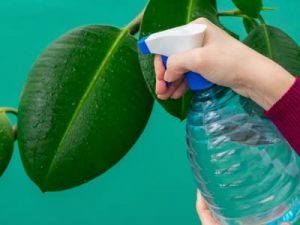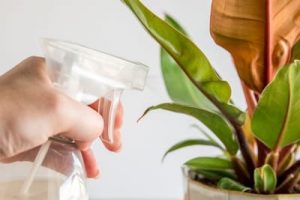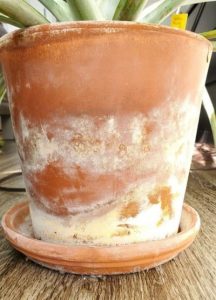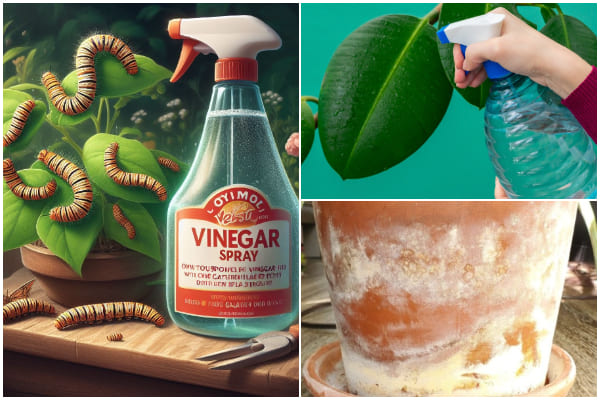Did you know that a simple household item like vinegar can transform your houseplant care routine? Vinegar, an affordable and natural product, offers surprising benefits for houseplants, from pest control to enhancing soil pH. Discover the best vinegar hacks for plants and learn how to use this secret weapon effectively!

1. Natural Pest Repellent

If you’re dealing with annoying pests like gnats or ants invading your houseplants, vinegar could be the perfect natural solution. These tiny pests can wreak havoc on your plants, but a simple homemade vinegar spray can keep them at bay. To create this DIY pest repellent, combine one part vinegar with three parts water in a spray bottle. Gently mist the soil’s surface where pests are most active. The strong aroma of vinegar acts as a natural deterrent, effectively driving away pests without resorting to harsh chemicals. However, it’s important to use this solution carefully—avoid spraying the mixture directly on the leaves or stems of your plants, as vinegar’s acidity could cause leaf burn or damage sensitive foliage. Incorporating this easy hack into your houseplant care routine is a safe and eco-friendly way to maintain a pest-free indoor garden.
2. Clean Your Houseplants’ Leaves

Dusty leaves on houseplants are more than just an eyesore; they can significantly hinder the plant’s ability to photosynthesize effectively. Photosynthesis is how plants convert light into energy, and when a layer of dust builds up, it blocks sunlight from reaching the leaves. To keep your plants thriving, regular cleaning is essential, and vinegar offers a simple and natural solution for the job. Mix one teaspoon of vinegar with a quart of water to create a gentle cleaning solution. Then, dampen a soft cloth with this mixture and carefully wipe each leaf, removing dust and grime. This method not only helps your plants stay healthy but also restores their natural sheen, giving them a polished and vibrant appearance. Cleaning houseplants with vinegar is an excellent way to maintain their freshness while supporting their overall growth. Incorporate this easy hack into your routine to keep your indoor greenery looking its best and functioning at its peak.
3. Balance Soil pH Naturally

Some houseplants and garden favorites, such as ferns, azaleas, and blueberries, thrive best in slightly acidic soil conditions. If you notice that your plants are struggling to absorb nutrients or showing signs of poor growth, adjusting the soil pH might be the solution. Vinegar, a natural and cost-effective alternative to commercial soil treatments, can be a quick fix to lower the pH and create a more favorable environment for acid-loving plants. To use this method, simply mix one tablespoon of vinegar with a gallon of water, ensuring it’s well-diluted to avoid over-acidifying the soil. Then, apply this solution as a soil drench around the base of the plants. This easy DIY hack not only adjusts the soil pH but also supports healthier roots and improved nutrient uptake.
For plant lovers seeking eco-friendly ways to enhance their garden, adjusting soil pH with vinegar is an excellent trick to keep in mind. Just remember to test your soil periodically to ensure the pH remains balanced, as overuse of vinegar can shift the levels too far. By incorporating this simple practice, you can give your acid-loving plants the perfect foundation to flourish.
4. Eradicate Stubborn Weeds

Weeds growing in your potted plants can be a frustrating sight and more than just an aesthetic problem—they compete with your houseplants for essential nutrients and water. Over time, this can weaken your plants and hinder their growth. Fortunately, there’s a simple and natural solution that doesn’t require harsh chemicals: white vinegar. Using vinegar as a weed killer is an effective and eco-friendly approach that takes advantage of its natural acidity to dry out and eliminate unwanted growth. To tackle these pesky intruders, fill a spray bottle with undiluted white vinegar and carefully spray it directly onto the weeds. Within a day or two, the weeds will begin to dry out and die, leaving your houseplants free to thrive without competition.
However, precision is key when using this method. Be sure to target only the weeds, as vinegar can damage the roots or leaves of your beloved houseplants if applied too broadly. This is one of the easiest vinegar plant tricks to tackle weeds effectively while ensuring your houseplants stay healthy and nutrient-rich. By including this simple step in your plant care routine, you can maintain beautiful, thriving indoor greenery without resorting to synthetic weed repellent.
5. Revive Dull Pots and Saucers

Over time, mineral deposits from hard water or fertilizers can accumulate on your plant pots and saucers, leaving unsightly white or crusty stains that diminish their appearance. These deposits not only look unpleasant but can also be challenging to remove with regular cleaning methods. Luckily, vinegar offers a simple and natural solution to restore your pots to their original shine. Thanks to its acidic nature, vinegar breaks down the stubborn mineral buildup effortlessly.
To use this method, create a cleaning solution by mixing equal parts white vinegar and warm water in a large container. Submerge the pots and saucers in the solution and allow them to soak for 15–30 minutes. This soaking process loosens the deposits, making them easier to remove. After soaking, scrub the pots gently with a brush or sponge, focusing on areas with heavy buildup. Rinse thoroughly with clean water and let them dry before returning them to your plants.
Incorporating these vinegar hacks for plants into your routine not only keeps your pots clean but also enhances the overall look of your indoor garden. Clean pots contribute to a polished and well-maintained space, letting your beautiful plants truly shine as the stars of your home. Whether you’re dealing with terracotta, ceramic, or plastic pots, this easy cleaning method is a must-try for every plant enthusiast.
6. Control Mold and Mildew
Mold or mildew on soil or pots is a common problem for houseplants. A spray made from equal parts water and vinegar can prevent fungal growth. Use sparingly to avoid altering soil composition too much.
These surprising vinegar hacks for houseplants prove that natural solutions can be just as effective as store-bought ones. From pest control to soil improvement, vinegar is a versatile tool every plant parent should have in their arsenal. Try these DIY plant care hacks today and watch your houseplants thrive!
Do you use vinegar in your plant care routine? Share your tips in the comments below!

